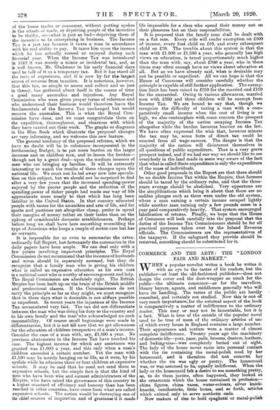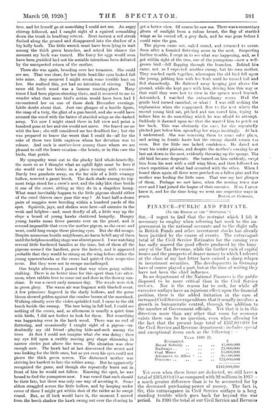COMMERCE AND THE ARTS : THE " LONDON FAIR AND
MARKET."
WHEN a popular novelist writes a book he writes it with an eye to the tastes of his readers, but the publisher—at least the old-fashioned publisher—does not design the cover and the dust-wrapper so much for the public—the ultimate consumer—as for the travellers, library buyers, agents, and middlemen generally who will have its handling. The tastes of the public are hardly consulted, and certainly not studied. Now this is not of very much importance, for the external aspect of the book is comparatively a matter of indifference to the ordinary reader. This may or may not be lamentable, but it is a fact. What is true of the outside of the popular navel used to be true of most of the ordinary articles of use of which every house in England contains a large number. Their appearance and texture were a matter of almost complete indifference. Twenty years ago the machinery of domestic life—pots, pans, pails, brooms, dusters, leathers, and baking-tins—was completely buried out of sight. The lady of the house never came into personal contact with the tin containing the metal-polish used by her housemaid, and it therefore did not concern her whether the tin was ugly or pretty. The housemaid was, or was assumed to be, equally indifferent. When the lady or the housemaid felt a desire to see something pretty, as, to do them justice, often happened, they looked at the ornaments which the house contained in profusion— china figures, china vases, water-eolours, silver knick- knacks, candlesticks, little boxes, and so forth, articles which existed only to serve aesthetic ends. Now makers of bins to held spaghetti or metal-polish troo, and let herself go at something I could not see. An angry chirrup followed, and I caught sight of a squirrel scrambling down the trunk in headlong retreat. Next instant a red streak flashed along the ground and disappeared into the shadow of a big holly bush. The little wretch must have been lying in wait among the thick green branchea, and seized his chance the moment my back was turned. His fancy for eggs would soon have been gratified had not his amiable intentions been defeated by the unexpected return of the mother.
There she was again, brooding over her treasures. She could see me. That was clear, for her little bead-like eyes looked full into mine. Any moment I might wreak some terrible hurt on her. She realized this, yet had no intention of stirring. That same old larch wood was a famous roosting-place. Many times I had been pigeon-shooting there, and it occurred to me to wonder what that same bird's action would have been had I encountered her on one of those dark December evenings. Little doubt about that. .Just one glimpse of a hostile figure, the snap of a twig, the glint of a gun-barrel, and she would have aroused the wood with the batter of startled wings as she dashed away. Yet now I might stand there in full view and point a hundred guns at her and she would not move. She feared me no whit the less ; she still considered me her deadliest foe ; but she was prepared to brave the worst that I could do—all for the sake of those two little captives whom her devotion was to release. And such is mother-love among those whom we are pleased to call the lower creation—the beasts, or in this case the birds, that perish.
My sympathy went out to the plucky bird whole-heartedly, the more so as I thought what an uphill fight must be hers if she would roar her babies in a place teeming with enemies. Barely two gunshots away, on the far side of a little swampy hollow, towered a gaunt beech. The dark shade among its top- most twigs stood for a crow's nest, and the inky blot close beside it one of the crows, sitting as they do in a shapeless hump. What must inevitably -happen to the little pigeons should either of the cruel thieves once pass this way ? At least half-a-dozen pairs of magpies were breeding within a hundred yards of the spot. Squirrels, jays, and shrikes were here—all enemies to the weak and helpless—and, most deadly of all, a little way up the slope a brood of young hawks chattered hungrily. Hungry young hawks mean fierce parents ever on the prowl, and it seemed impossible that even the mother pigeon, as she canso and went, could long escape those piercing eyes. But she did escape. Despite numerous hostile neighbours, no harm befell any of them until the helpless nestling stage was almost passed. I was watching several little feathered families at the time, but of them all the pigeons seemed the hardiest, grew the fastest, and it appeared probable that they would be strong on the wing before either the young sparrowhawks or the crows had quitted their respective nests. But they were not to escape unchallenged.
One bright afternoon I passed that way when going rabbit- stalking. There is no better time for this sport than late after- noon, when rabbits love to come out and doze in the drowsy sun- shine. It was a sweet early summer day. The woods were rich in green glory. The warm air was fragrant with bluebell scent. A few primroses lingered in the shady hollows, and the gorse bloom showed golden against the sombre brown of the moorland. Walking silently over the violet-sprinkled turf, I came to the old beech beside the swamp. The tree being in full leaf, I could see nothing of the crows, and, as afternoon is usually a quiet time with birds, I did not bother to look for them. But something was happening over in the larch wood. There was no end of fluttering, and occasionally I caught sight of a pigeon—un- doubtedly my old friend—playing hide-and-seek among the trees At first I could not imagine what she was doing ; then my eye fell upon a swiftly moving grey shape skimming in narrow circles just above the trees, The situation was clear enough now. The hawk had at last discovered the secret and was looking for the little ones, but as yet even his eyes could not
pierce the thick green screen. The distressed mother was
striving her hardest to lure the robber away. But he apparently recognized the game, and though she repeatedly burst out in front of him he would not follow. Knowing the spot, he was bound to find the youngsters now. I was vexed that such should be their fate, but there was only one way of averting it. Some alders straggled across the little hollow, and by keeping under cover of these I might get within shot of the raider as he swept round. But, as ill luck would have it, the moment I moved from the beech shadow the hawk swung out over the clearing to get a better view. Of course he saw me. There was a momentary gleam of sunlight from a rufous breast, the flay of startled wings as he veered off, a grey flash, and he was gone before I could raise the gun.
The pigeon came out, sailed round, and returned to cover. Soon after a frenzied fluttering arose in the nest. Suspecting further trouble, I crept in to see what was happening, and, as I got within sight of the tree, one of the youngsters—now a wall- grown bird—fell flapping through the branches. Behind hint came, not, as I expected, another enemy, but his own mother. They reached earth together, whereupon the old bird fell upan the young, jabbing him with her beak until he turned tail 'and fled shamelessly. He fluttered away keeping just above the ground, while she kept pace with 'him, driving him this way or that until they were lost to view in the spruce wood beyond. Astonished, I watched the extraordinary scene. Had the gentle bird turned cannibal, or what ? I was still seeking the explanation when she reappeared, flew to the nest where the second young bird sat, pitched and ran round him, trying to induce him to do something which ho was afraid to attempt Suddenly it dawned upon M3 that she wanted him to perch on her back. This was obviously the case, for she repeatedly pitched just below him, spreading her wings invitingly. At last I understood. She was removing them to seine safer plane, and acting in frantic haste lest the enemy should return tea soon. But the little ono lacked confidence. He dared not trust his tender pinions, and despite the mother's coaxing he at last sat down in the nest, evidently throwing up the sponge. The old bird became desperate. She turned on him suddenly, swept him from his seat with a stiff wing blow, and then followed an exact repetition of what had occurred with the other. When I found them again all three were perched on a fallen pine and the mother was feeding the little ones. That was my last glimpse of them. Perhaps we met later, when the nesting truce was over and I had joined the league of their enemies. If so, I never knew it, and for the time being we went our respective ways is





































 Previous page
Previous page